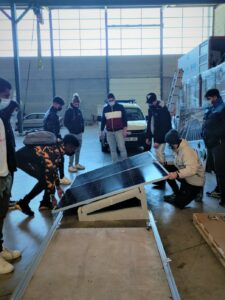Fundación Iberdrola España brings together the 42 entities of its social action program in a day of innovation and collaboration
- Financial support for women entrepreneurs, the incorporation of young people into renewable energy projects, and the inclusion of disabled groups in the labor market are among the success stories shared.
- More than 415,000 people have already benefited from the Foundation’s Social Program, which has boosted the creation of some 1,800 jobs in Spain.
- Since 2010, 12 million euros have been allocated to social initiatives with third-sector organizations.
Open collaboration has been the protagonist of the second meeting between social entities organized by Fundación Iberdrola España, in which participants have shared some of the successes and challenges of the projects they develop in the social program. In this call, more than 40 initiatives are being carried out, which the Foundation co-finances. The fight against child poverty, school support, and the social insertion of children, young people, and women in vulnerable situations are among its main objectives.
A clear example is the Crea program, presented at the meeting by Fundación Nantik Lum, which works with groups of women at risk of exclusion to help them develop their employment and entrepreneurial skills. Six of them have already launched their business idea thanks to financial support or access to social microcredits. This project also includes working groups on ‘financial health’, to help them with their personal and family economic concerns.

Save the Children and collaborators such as the GFM Photovoltaic Foundation also presented their success stories in collaboration with the Iberdrola Foundation. They have programs in place for young people in vulnerable situations focused on new job opportunities in renewable energies. Over a hundred young people have accessed the labor market through its Inspira program in Castilla – La Mancha.
Another project that supports the incorporation of young people at risk of exclusion into the labor market is that of the Exit Foundation, with a project in which volunteers from large companies help them to discover their vocation. This program has already had 700 young people who have received guidance to get a clearer vision of their professional future.
The Down Asturias Association has stressed the need to create opportunities at all stages of life that allow the social inclusion of people with disabilities. To prepare them for the workplace, they are currently working with groups of pre-employment internships and supported employment among companies in the region.
The president of Fundación Iberdrola España, Fernando García, highlighted “the work of all the entities with which we collaborate and their promotion of equality and inclusion”.
All the entities have highlighted the support of Fundación Iberdrola España and the importance of networking and public-private collaboration. To share and discuss innovative ideas for their current and future projects, 6 working groups were organized focusing on the lines of action of the participating institutions: women, children, and youth, addictions, disease, and disability. Among the conclusions, the importance of employment as the main way to overcome situations of vulnerability and exclusion was highlighted.
Iberdrola, committed to society
Iberdrola, through the Social Program of Fundación Iberdrola España, has allocated more than 12 million euros to social initiatives in the country and helped a total of 414,546 people. Since the launch of this Plan in 2010, the company has promoted more than 500 projects in collaboration with more than one hundred social entities, contributing to the fight against child poverty, school support, and the social integration of children, young people, and women in vulnerable situations. The Social Program has enabled the creation of 1,830 jobs and the participation of 8,538 volunteers.
Fundación Iberdrola España also focuses its activities on its scholarship program in the fields of energy, biodiversity, and the environment, on supporting research on issues related to energy and climate change, as well as in the cultural field, focusing on the restoration and maintenance of the cultural and artistic riches of the Iberian Peninsula’s heritage.

